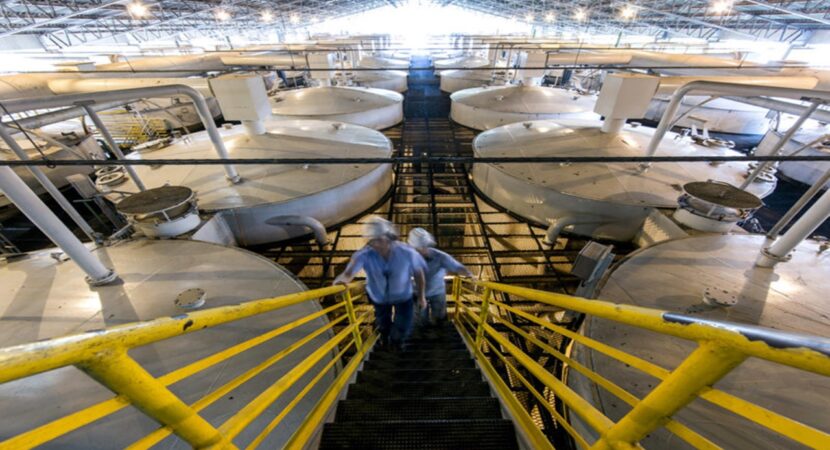
President of Volkswagen in Latin America says that the current moment is critical to define whether Brazil "will be a protagonist or not" in ethanol. "Technology and energy are changing very quickly, and we need to embrace that."
Francis Queen, vice-president of ethanol, sugar and bioenergy at Raízen, stated that the company may license second generation ethanol technology, or 2G, to other countries, “We need to have more producing countries, this is essential for ethanol to be a global commodity”, he said on May 25, during the Fenasucro & Agrocana Trends event.
Read also
- Volkswagen announces the installation of the Baterias Moura factory, in its industrial complex in RJ, for the production of the first electric truck in Brazil!
- Scientists develop transparent electrode that can turn windows into solar panels and discovery promises to revolutionize renewable energy generation in the world
- Prices of gasoline, ethanol, diesel and CNG keep rising and the newest CNG fuel came to 'save' application drivers, taxi drivers and workers
- Mega oil exploration project will hire 100 platforms, build 50 ships, generate more than 400 jobs and export 25 million tons of oil by 2024 in the Arctic
- Sale of hydrated ethanol between distributors was definitively prohibited by the National Agency of Petroleum, Natural Gas and Biofuels
“We see very positively that India will increase ethanol production, we want to see that in Thailand as well. We, at Raízen, are willing to help technically. We are even talking about licensing 2G ethanol technology to other countries.” 2G is produced with by-products or co-products of the conventional biofuel production process.
The director of Biofuels at the Ministry of Mines and Energy, Pietro Mendes, was present at the same event, who said that the government works to expand ethanol globally both in terms of public policies and with the private sector. “It is important that other governments understand how Brazil has developed a public policy on ethanol, what regulation is like. But that doesn’t work without the private sector either,” he said.
The great frontier of biofuel expansion at the moment is in Asia, in countries like India and Thailand
According to Pietro, the great expansion frontier at the moment is in Asia, in countries like India and Thailand. “These two are already sugar producers, so it has a double positive effect for our sector. You reduce the supply of sugar and balance the market, and increase the number of ethanol producers, so Brazil is not left alone with this flag.” Mendes also highlighted the need to export automotive technology, to demonstrate that the use of ethanol does not cause problems in vehicles.
According to the Indian ambassador to Brazil, Suresh Reddy, who also participated in the meeting, he stated that Indian companies are starting to enter the ethanol sector with greater force, and that the moment is good to analyze partnership options. “India is among the top automobile producers, so we have a big market. And our middle class has been growing,” he added.
For Pablo di Si, head of Volkswagen in Latin America, the current moment is critical to define whether Brazil “will be a protagonist or not” in ethanol. “Technology and energy are changing very quickly, and we need to embrace that.” When asked about ethanol-powered electric vehicles, he said more research is still needed.
UTE by Raízen Geo Biogás is the first biogas thermal plant in the country to receive renewable energy certification
UTE Biogás Bonfim, a Raízen Geo Biogás unit located in Guariba (SP), was certified by the I-REC Standard. One of the largest biogas plants in the world, with 21 MW of installed capacity, the thermal plant is the first among the 200 plants already certified by the I-REC Standard that use biogas for electricity generation.
Raízen Geo Biogás is the result of a joint venture between Raízen and Geo Energética. The certified UTE was inaugurated last October and is located next to Usina Bonfim, owned by Raízen, with a crushing capacity of more than 5 million tons of sugarcane. The thermal plant uses biogas produced from vinasse and filter cake, residues from the sugar and alcohol process.
Of the 138 thousand MWh per year of installed capacity, 96 thousand MWh will be supplied to the National Interconnected System (without) in a contract obtained by Raízen in the A-5 auction of 2016. The excess energy can be traded in the free market or other contracts.
Raízen of the Shell Group wants to build three plants producing ethanol made from sugarcane bagasse and straw
Raízen, the global giant producing ethanol together with Shell, intends to build three more cellulosic ethanol plants — or second generation. The good news was announced by businessman Rubens Ometto, from Cosan, on March 15, in a live broadcast by Valor.
Cellulosic ethanol is made from sugarcane bagasse and straw. In Piracicaba (SP), the group already has a plant producing this type of fuel, which, according to the businessman, has increased international demand due to the carbon sequestration generated.
“We want to build three plants of this size, with the production of an additional 300 million liters of second generation alcohol”, revealed Ometto. “Companies like Shell, Exxon-Mobil, Total, they all have the greatest interest in acquiring this ethanol, given the carbon sequestration it has.”
The technology for producing cellulosic ethanol emerged from a partnership between Shell and the Canadian company Logen, specialized in biotechnology. In the past harvest (2019/20), the Piracicaba unit produced 226 liters of ethanol for each ton of dry biomass.












